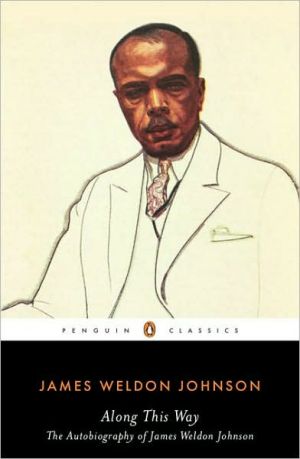

 |

|

The average rating for Along This Way: The Autobiography of James Weldon Johnson based on 2 reviews is 5 stars.
Review # 1 was written on 2017-01-11 00:00:00 Jeremy Lagant Jeremy LagantJohnson's "Along This Way" James Weldon Johnson (1871 -1938) was the closest American approximation possible to a Renaissance man. He is best-known for writing the lyrics to "Lift Every Voice and Sing", considered the "African-American National Anthem." He was a poet, the author of "God's Trombones" among much else (including the poem "Fifty Years" still one of the best meditations on Lincoln's Emancipation Proclamation) and of the famous novel "The Autobiography of an Ex-Colored Man" (1912). But Johnson was much more. He served several tumultuous years in diplomatic service as American consul to Venezuela and Nicaragua. With his brother, Rosamund, and Bob Cole, he formed part of a famed and highly-successful black songwriting and Vaudeville team in the early years of the Twentieth Century. Johnson founded the first African-American high school in his home town of Jacksonville, Florida and, almost in passing, he became the first African-American admitted to the Florida bar without attending Law School (by reading law and passing a treacherous oral examination.) Johnson was a newspaper editor and a founder of the NAACP where he took an active role in litigating against laws restricting the voting rights of African-Americans, and, in particular, worked tirelessly in support of Federal anti-lynching legislation. In the final decade of his life, Johnson taught creative writing and American literature at several universities and lived, for a time, the life of contemplation and reflection that he said had been his lifelong goal. Johnson lived an inspiring life. And in his autobiography, "Along this Way" (1933) he allows the reader to share in much of it. The autobiography is a lengthy and detailed work in which Johnson not only tells the story of his life, but he also describes a good deal of African-American history in the South, where he grew up, and in the rest of the United States during the pivotal half-century following Reconstruction. We can see in Johnson's story, for example, how segregation and Jim Crow gradually but forcefully came to pervade the Southern States in the late 19th and early 20th century. Johnson also gives vibrant descriptions of life in New York City, of the growth of Harlem, and of African-American singers, actors and entertainers on Broadway -- in which he himself played a prominent role. There are chilling descriptions of lynching and of Johnson's efforts to bring this barbaric practice to an end. One of the more memorable scenes of Johnson's personal life in the book is a description of how he himself was almost lynched when he was observed talking alone to a light-skinned woman in a public park in Jacksonville. (His would-be attackers thought the woman was white.) The book is divided into four main sections, with the first describing Johnson's childhood and education at Atlanta University. Part two presents a picture of New York City and Johnson's efforts as a songwriter. Part three focuses on Johnson's consular work in Latin America while Part four discusses Johnson's work with the NAACP. These are only the broadest, bare-bones descriptions of an extraordinary life. Johnson combines his discussion of his public life with insightful comments on most of his writings, including his poetry, novel, his history "Black Manhattan" and his work as an anthologizer of African-American poetry and of Spirituals. There are moments in the book when I wanted to know more of Johnson's inner life. He tells us, for example, of his courtship of and marriage to Grace Nail but, with the exception of some discussion of her reactions to Johnson's diplomatic posts, we see little of her in the book. Johnson is reticent, in common with most writers of autobiography, in letting us see too deeply beyond the public figure. But at the end of the book, he offers the reader some broad reflections, centering upon his agnosticism and of his hopes and ambitions for humanity. Johnson's life focused upon his efforts to secure the rights of black people in the United States, but his life, work, and writings were universal in theme. In "Along this Way" he gives us the story of a life both active and reflective. His book is a precious work of American literature. Robin Friedman |
Review # 2 was written on 2020-08-07 00:00:00 Eilish Fox Eilish FoxI learned a great deal about Mr. Johnson, of which I was unawares. He was a fascinating, brilliant, creative man who attempted, as best he could, to make the world better, not only for his race, but for every race, for every man, woman, and child. This is a MUST READ FOR EVERYONE! |
CAN'T FIND WHAT YOU'RE LOOKING FOR? CLICK HERE!!!